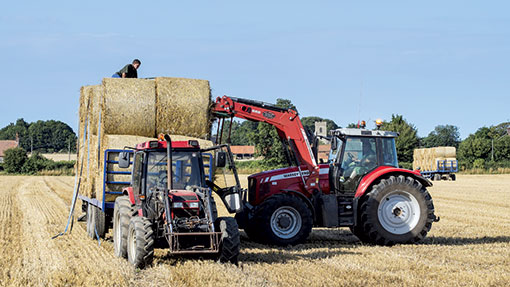Energy demand for straw heats up in the East

Growing demand for straw to generate energy is opening up new markets for growers.
Eco2’s straw-fired power station at Sleaford began commercial generation last month and is the latest in a number of similar plants that are operational or in the planning pipeline (see table).
Straw pelleting company Pelco has also recently announced plans to build five new pelleting plants in eastern England.
See also: Burning demand for straw power
Each plant will have capacity to take 132,000t of straw from growers within a 50-mile radius, producing 125,000t of pellets a year for industrial uses and wholesale markets.
Finance for the first two plants at Ely and Selby has been secured, subject to planning approval, and both are due to enter the planning process in the first quarter of 2015, says Pelco chief operating officer Simon Barnard. Another three at Daventry, Harlow and Swindon are also planned.
“We’re signing up growers now with the view to taking straw from the 2016 harvest.”
Increasing availability
The firm will take only wheat and oilseed rape material and will not accept barley straw.
Mr Barnard believes encouraging more arable farmers to bale straw rather than incorporating it will increase market availability and help growers offset grain price volatility by providing an additional source of income.
“We are well aware of the diversity of uses of straw, so our objective is to create more availability by offering consistent, beneficial contract terms that make it attractive for growers to supply energy markets,” he says. “We’ve examined these markets and are confident they are resilient ones. If we can break down the barriers to farmers and landowners supplying straw for energy we are sure there is sufficient straw available.”
Wilson Wraight is responsible for straw procurement, and farmers, contractors and merchants are being offered different annual and long-term (eight-year) contract options at index-linked prices, which for 2016 are £18.50/t in the swath (annual contract) and £20/t (eight-year contract).
Pelco-approved contractors are typically responsible for baling, loading and delivering straw, while farmers will need to insure straw while it is on site. The firm is offering farmers interest-free advance payments of £25/contracted ha, payable in August preceding the harvest year, a late delivery bonus, and the option of erecting a storage barn to reduce wastage.
These barns would be owned, funded and constructed by Pelco and leased under licence to the landowner for 16 years for a peppercorn fee, with an option to break half-way.
Devil in the detail
Brown & Co’s head of renewable energy Rob Meadley advises growers considering any straw-for-energy contracts to look closely at the terms and whether the returns compensate for the main barriers to baling straw.
Three of the biggest reasons for not baling are timeliness of operations, concerns over blackgrass spread and the loss of soil nutrients from not incorporating straw, he notes.
Particular attention needs to be given to the basis of any contract price (ex-farm or delivered, moisture content, bale size, etc.); delivery and payment terms; collection criteria; responsibility for straw at each stage; the length of contracts/ break clauses; and any force majeure provisions in the event of wet harvests, he says.
With losses from open stacks typically around 8% to 18%, it is worth considering building a simple shed, he adds. “You can put up a basic 1,000t straw shed for between £55,000 and £65,000, so with ex-farm prices [for baled straw] of £40-45/t, it can soon pay for itself, especially if you can get a little extra from late delivery payments too.”
Energy straw demand | |||||
|---|---|---|---|---|---|
Location | Owner/ operator | Generation capacity | Annual straw requirement | Status | |
Ely, Cambridgeshire | Energy Power Resources (EPR) http://ely.eprl.co.uk | 38MW | 210,000t (straw + miscanthus) | Operational since 2000 – the first straw-fuelled power station in UK. | |
Drax, Yorkshire | Drax Group www.drax.com | Co-firing biomass with fossil fuel | 83,000t (of which 60,000t is wheat and OSR, 23,000t miscanthus) | Operational. | |
Sleaford, Lincolnshire | Managed by Eco2 on behalf of Glennmont Partners www.sleafordrep.co.uk | 40MW | 238,000t (wheat + OSR) + some woodchip | Operational – commercial operation began in September 2014. | |
Brigg, Lincolnshire | Eco2 www.briggrep.co.uk | 40MW | 238,000t (mainly wheat + some other crops, miscanthus or wood chip) | Planning granted Oct 2011. Under construction, operational Jan 2016. | |
Ely, Selby, Harlow, Daventry and Swindon | Pelco www.pelco.co.uk | Pelleting plants only | 132,000t per plant (wheat + OSR) | Construction at Ely and Selby due to start in 2015, subject to planning approval being granted. | |
Snetterton, Norfolk | Eco2 and Iceni Energy snettertonbiomassplant.co.uk | 40MW | 250,000t (cereals, OSR straw + miscanthus and wood chippings) | Planning granted July 2012. Construction to begin by end of 2014. | |
Tansterne, East Yorkshire | GB-BIO www.gb-bio.com | 12.5MW | 60,000t | Planning permission granted 2011. Awaiting funding. | |
Mendlesham, Norfolk | Eco2 | 40 MW | N/A | Planning refused 2013. Project shelved. | |
